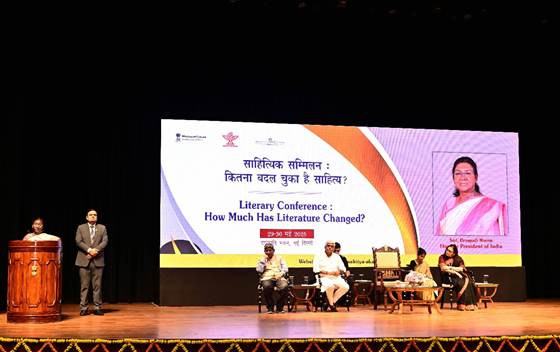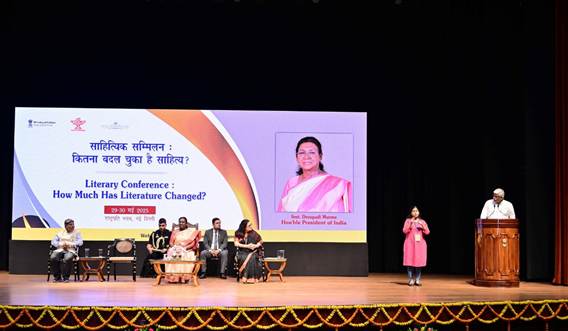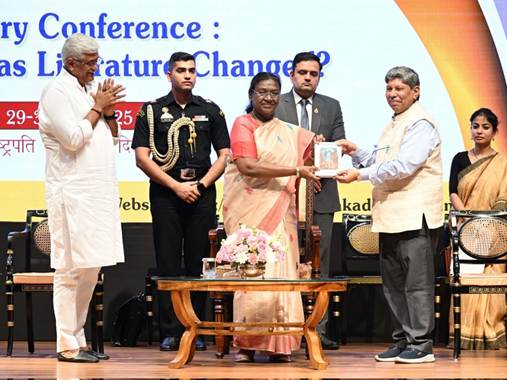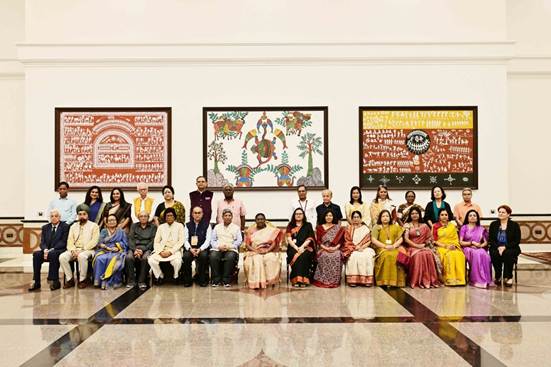Ministry of Culture
People can draw inspiration from literature and strive to realize their ideals: President Smt. Droupadi Murmu
Our Nation is undergoing an era of Cultural Revival under the leadership of PM Shri Narendra Modi: Shri Gajendra Singh Shekhawat
President of India Inaugurates National Literary Conference at Rashtrapati Bhavan
Rashtrapati Bhavan Hosts Literary Luminaries in Thought-Provoking Conference on the Changing Face of Literature
Posted On:
29 MAY 2025 8:30PM by PIB Delhi
In a landmark event held at the Rashtrapati Bhavan Cultural Centre, New Delhi, the Sahitya Akademi, under the Ministry of Culture, Government of India, in collaboration with Rashtrapati Bhavan, hosted a Literary Conference on “How Much has Literature Changed?” The event brought together a distinguished gathering of writers, poets, and literary thinkers from across India and was inaugurated by the President of India, Smt. Droupadi Murmu.

In her inaugural address, President Murmu expressed her lifelong respect and admiration for writers, noting it was a cherished desire of hers to host them at Rashtrapati Bhavan. She recalled Utkalmani Gopabandhu Das’ lines in Odia, which she later interpreted as “Wherever I am on the soil of this nation, I am as grateful as I would be on the premises of Jagannath Puri Yatra”. She drew parallels from literature, citing the story of Sita-Rama from Valmiki Ramayana as a unifying force in society. Reflecting on her personal experience, she shared how Fakir Mohan Senapati’s story “Rewati” had a profound impact on her life, highlighting the influence of literature. According to her, ordinary people can draw inspiration from literature and strive to realize their ideals. She called Pratibha Ray’s novel Draupadi as a great example of a classic rooted in human sensibilities. She said that literature does change with time but there are certain elements like compassion and sensibility which do not change. She further said that today’s literature cannot be called didactic literature since it is based on one’s experience.

Union Minister of Tourism and Culture, Shri Gajendra Singh Shekhawat speaking as the Guest of Honour opined that instead of asking how much literature has changed, it would be more appropriate to consider how much society has changed, as literature is a reflection of society. He cited example of Munshi Premchand as a writer who always attacked the evils of society. He said that under the able leadership of Sri Narendra Modi, Prime Minister of India, our nation is undergoing an era of cultural revival. Organizing this programme under the aegis of the President of India signifies a conscious cultural renaissance in the nation, he said.
Ms Ranjana Chopra, Special Secretary and Financial Advisor, Ministry of Culture, highlighted the achievements of Sahitya Akademi, including its work on Netaji Subhas Bose and international literary events like Unmesha. She acknowledged the evolving challenges literature faces amid rapid technological and social transformations.

At the beginning of the inaugural ceremony, Ms Ranjana Chopra, Special Secretary and Financial Advisor, while addressing the gathering praised Sahitya Akademi as one of the most prominent institutions under the Ministry of Culture, highlighting its numerous achievements and impactful activities in recent years, such as bringing out the book on Netaji Subhas Bose in record time or organizing international level programmes like Unmesha, among others. She called them great achievements of Sahitya Akademi. Expressing further, she said that the future of literature will evolve with technological and social advancements, posing challenges to preserve its originality.

The inaugural ceremony was followed by a captivating Poets’ Meet, “Straight from the Heart”, in which poets from various Indian languages participated. Dr K. Sreenivasarao, Secretary of Sahitya Akademi, felicitated the poets with Angvastram. Dr Madhav Kaushik recited a few Urdu couplets and a couple of ghazals, as the Guest of Honour during this session. The poets who recited their poems included Sri Ranajit Das (Bengali), Smt. Mamang Dai (English), Sri Dileep Jhaveri (Gujarati), Sri Arun Kamal (Hindi), Sri Mahesh Garg (Hindi), Sri Shafi Shauq (Kashmiri), Smt. Damayanti Beshra (Santali) and Sri Ravi Subramaniyan (Tamil). With their words infused with raw emotions, all the poets shared unfiltered expressions of joy, sorrow, love, and longing, creating an intimate connection with the audience. Sri Sheen Kaaf Nizam, eminent Urdu poet and scholar, chairing the session, said that poetry is not listened to but is felt. He recited many of his popular Urdu ghazals and concluded the session. The event marked a celebration of India’s literary diversity and a meaningful reflection on its enduring legacy and future direction.
***
Sunil Kumar Tiwari
pibculture[at]gmail[dot]com
(Release ID: 2132587)
Visitor Counter : 143